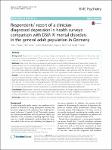Respondents’ report of a clinician-diagnosed depression in health surveys: comparison with DSM-IV mental disorders in the general adult population in Germany
Maske, Ulrike E.
Hapke, Ulfert
Riedel-Heller, Steffi G.
Busch, Markus A.
Kessler, Ronald C.
Background: Respondents’ report of a previously diagnosed depression by a health professional is frequently used to estimate depression prevalence. This study contributes to a better understanding of survey results based on this measure by comparing it with a comprehensive standardized diagnostic interview. Methods: Data came from the cross-sectional nationwide German Health Interview and Examination Survey for Adults (DEGS1) and its mental health module (DEGS1-MH, n = 4483). In DEGS1, participants were asked whether they have been diagnosed with depression by a physician or psychotherapist (last 12-month). DSM-IV-based 12-month major depressive disorder (MDD) and other mental disorders were assessed with the German version of the Composite International Diagnostic Interview (CIDI). Time lag between both assessments was 6 weeks (median). Results: 73.4% of participants reporting clinician-diagnosed depression met criteria for any mental disorder in the CIDI (any affective disorder: 51.8%, any anxiety disorder: 54.7%). The proportion of participants reporting a clinician-diagnosed depression who met MDD criteria was highest among those aged 18–29 years (62.6%) and decreased with age (65–79 years: 29.8%). Among participants with MDD, the proportion with clinician-diagnosed depression was 33.0%, highest among those aged 45–64 years (49.3%) and lowest among those aged 18–29 years (22.7%) and 30–44 years (20.3%). MDD severity was positively associated with clinician-diagnosed depression. Conclusions: Respondents’ report of a clinician-diagnosed depression and major depression assessed with the CIDI substantially differ. Concordance of both measures varies with age and severity of depressive symptoms. Health surveys should assess a range of depression indicators in order to cover a wide spectrum.
Dateien zu dieser Publikation
Keine Lizenzangabe

